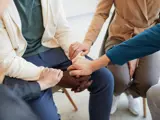If you're considering psychotherapy, several options are available. One of those options is group therapy. Depending on the nature of your problem, group therapy can be an ideal choice for addressing your concerns and making positive changes in your life.
What should I expect?
Group therapy involves one or more therapists who lead a group of roughly six to twelve clients. Typically, groups meet for an hour or two each week. Some people attend individual therapy in addition to groups, while others participate in groups only.
Many groups are designed to target a specific problem, such as depression, obesity, panic disorder, social anxiety, chronic pain or substance abuse. Other groups focus more generally on improving social skills, helping people deal with a range of issues such as anger, shyness, loneliness and isolation. Groups often help those who have experienced loss, whether it be a spouse, a child or someone who died by suicide.
What Does Group Therapy Help With?
One of the goals of psychotherapy is to learn more about yourself and how your emotions impact your life and relationships. Group therapy provides an environment for you to learn more about yourself while interacting with other people who are experiencing something similar.
Having a mental health condition or emotional challenges can be isolating. Group therapy helps you to see that you are not alone in your struggle.
Groups can act as a support network and a sounding board. Other members of the group often help you come up with specific ideas for improving a difficult situation or life challenge, and hold you accountable along the way. Many people find it helpful to participate in both group therapy and individual psychotherapy. Participating in both types of psychotherapy can boost your chances of making valuable, lasting changes. If you've been involved in individual psychotherapy and your progress has stalled, joining a group may jump-start your personal growth
Confidentiality is an important part of the ground rules for group therapy. However, there's no absolute guarantee of privacy when sharing with others, so use common sense when divulging personal information. That said, remember that you're not the only one sharing your personal story. Groups work best where there is open and honest communication between members.
Group members will start out as strangers, but in a short amount of time, you'll most likely view them as a valuable and trusted source of support.

